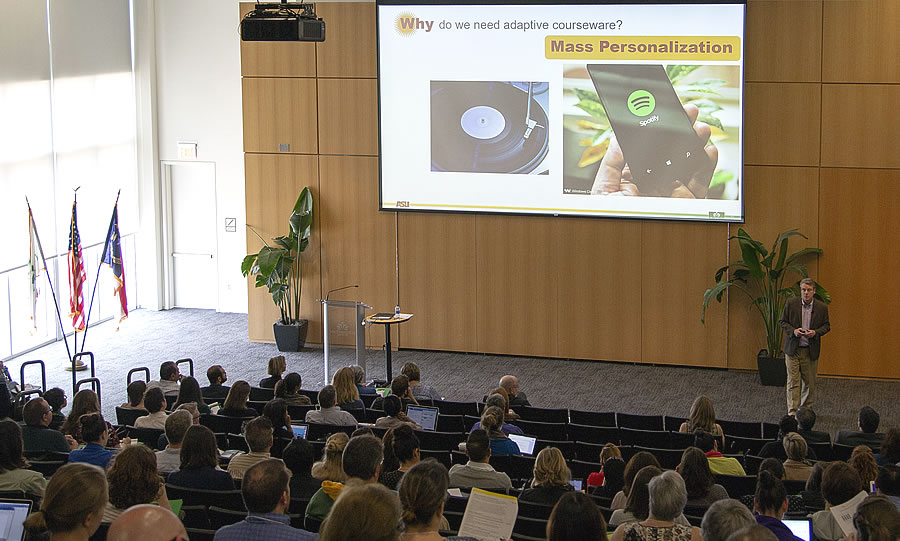
More than 200 people from 33 different colleges and universities across the region recently gathered at UNC Charlotte Center City to learn how to leverage digital classroom technologies for student success.
For some attendees, the second annual Southeastern Digital Learning Forum presented an opportunity to learn more about adaptive learning and how it is having an impact on student learning.
“At UNC Charlotte, faculty members are currently building or delivering courses that leverage adaptive learning technologies in computer science, engineering, chemistry and statistics, with several others evaluating different adaptive tools for use in the upcoming academic year,” said Garvey Pyke, director for the University’s Center for Teaching and Learning. “While a lot of attention is being paid to adaptive learning in STEM classes, this kind of individualized student experience is also valuable in the humanities and social sciences.”
 The forum’s keynote speaker, Dale Johnson, is adaptive program manager at Arizona State University. He described for attendees how personalized learning is now possible, even in large classes, thanks to the latest digital innovations. The goal of adaptive learning, according to Johnson, is being able to deliver "the right lesson to the right student at the right time." He also stressed that using adaptive technologies can allow the instructor to redirect valuable class time to use more active learning methods.
The forum’s keynote speaker, Dale Johnson, is adaptive program manager at Arizona State University. He described for attendees how personalized learning is now possible, even in large classes, thanks to the latest digital innovations. The goal of adaptive learning, according to Johnson, is being able to deliver "the right lesson to the right student at the right time." He also stressed that using adaptive technologies can allow the instructor to redirect valuable class time to use more active learning methods.
About 40 universities, with Arizona State among them, have made adaptive learning pedagogies widely available to their students. Johnson noted the use of adaptive learning has moved beyond the innovators and "early adopters" and is now moving into the "early majority" phase of adoption, where more and more schools are heading, like UNC Charlotte and others in attendance.
Some of the adaptive learning projects at UNC Charlotte have been supported by a grant from the UNC System Office, along with support from the University’s Academic Affairs, the Office of Undergraduate Education and the Center for Teaching and Learning (CTL), as these efforts are aligned with the University’s student success strategies.
According to Pyke, it takes significant effort for faculty to adopt new materials and redesign their courses. In some cases, like in computer science and engineering, faculty are redesigning the student experience from the ground up by building the materials, the learning maps and the classroom activities to be in alignment. This kind of project is a collaborative effort that goes beyond faculty and CTL but also includes the learning architects with the courseware provider.
Provost Joan Lorden welcomed the attendees to the second annual Southeastern Digital Learning Forum, a regional event that is part of the Association of Chief Academic Officers' Digital Fellowship program. Lorden, along with the event co-sponsor Margaret Annunziata, vice president for academic affairs at Davidson County Community College, have been proponents of adaptive learning.
Annunziata noted, "The energy present in (UNC Charlotte) City Center was evidence of the power that we have across our systems to transform our students’ learning experiences through the use of adaptive learning tools."
Provost Lorden said she welcomed the opportunity to increase collaboration between the UNC System and the N.C. Community Colleges.